This month’s field trip with Yad Ben Zvi was different from its predecessors. Instead of concentrating on a particular book or chapter of the Bible, our band of intrepid explorers ( 😉 ) set off in pursuit of the many ways in which the Bible has inspired the world of song.
Whether it’s musical settings of Biblical texts, the influence of Biblical concepts and phrases on the Hebrew language, or contemporary takes on Biblical narratives, the Bible provides an endless source of inspiration.
A word first about the weather. Our trip took place three days before Tu B’Shvat, the New Year for the Trees. Technically, we are still in the middle of winter, but throughout Israel, round about Tu B’Shvat, many wild flowers are already in bloom and, traditionally, it is on Tu B’Shvat that the almond trees which symbolise the Holy Land (Land of the Almond Tree) burst into blossom. At the same time, however, the weather at this time of year is often cold and rainy. And, in fact, as we left Jerusalem, the grey, lowering skies threatened heavy rain and as we drove north, they made good on their promise.
The cold and the rain didn’t seem to bother this camel whom we met at the Almog Junction, where we stopped for morning coffee:
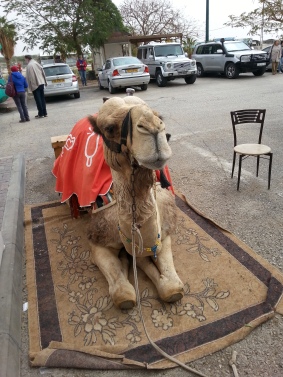
Although it was no longer raining by the time we reached the Dubi and Eran Shamir Observation Point, at one of the highest points in the Gilboa Mountain Ridge, it was still very, very windy. Dubi and Eran Shamir were a father and son, both of whom loved hiking around the Israeli countryside, and both of whom fell in defence of Israel. Dubi was killed in 1977, in a training accident and his son, Eran, fell in battle in the Lebanon in 1997.
At the entrance to the observation point is a stone bearing a fragment of a poem by Yosef Sarig, who was himself killed in battle on the Golan Heights, in the Yom Kippur War.
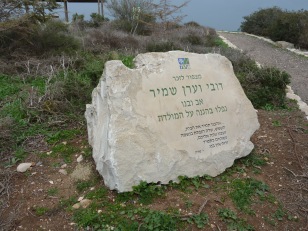
The fragment translates as follows:
“We always loved our home,
The sun, the field that opens in the soul
And now we have returned to them,
Uncomplicated as ever
But there is no breath in us.”
In the last line, as you can see, the poet is echoing the expression used in Ezekiel 37:8, to describe the dry bones which are “the whole House of Israel”.
As I said, it was very windy at this spot on the Gilboa Ridge. In fact, it is one of the windiest spots in the country, which is why there is a wind farm there.
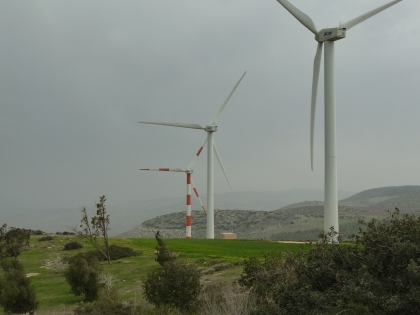
I always feel slightly nervous, looking up at huge wind turbines, like this. They seem to me like strange, other-worldly aliens towering over the Biblical landscape.
The Gilboa, overlooking the Jezreel Valley, is most famous as the site of King Saul’s final battle against the Philistines – a battle in which not only Saul, but also his sons Jonathan, Abinadab and Malchishua met their deaths (1 Samuel 31:1-6).The battle inspired the songwriter and poetess Leah Naor and the composer, conductor and music teacher Yosef Hadar, to present the following song – which links that ancient battle with later, contemporary battles – at the 1969 Israel Music festival:
This is such a beautiful song that I cannot resist translating it for the non-Hebrew speakers among you. (The Hebrew speakers can follow the words in the subtitled video-clip.)
“Lovely is the summer in its season
On Mount Gilboa.
Saul leaned on his spear
On Mount Gilboa.
Only a lad was with him,
A lad of the sons of Amalek.
Dry and hot, dry and hot
In summer, in the Emeq (Valley of Jezreel).
The earth is the colour of coal,
In summer in the Emeq.
Perchance there was a Sharav,
Perchance it was the hour of sunset,
Perchance a golden sunset,
Like today, at the same hour.
The Emeq was spread out at his feet
On Mount Gilboa.
The summer was as it is now,
On Mount Gilboa.
Lying opposite, Mount Tabor,
And Mount Hermon in the distance.
As if years haven’t passed
On Mount Gilboa.
The same rocks – arid rocks
On Mount Gilboa
Perchance there was a Sharav etc.”
Almost a quarter of a century earlier, in 1945, Nathan Alterman published his poem “Hineh Tamu Yom Krav” (הנה תמו יום קרב – Behold the day of battle is ended), in which he describes the bringing of the terrible news to King Saul’s mother. Written in the wake of World War Two, it was set to music in 1960 by the Israeli composer Mordechai Zeira and can be heard every year on Remembrance Day, the day which precedes Israel’s Independence Day. It’s rather long, so I will only translate parts of it, but you can hear the complete recording here:
“Behold, the day of battle and its evening are done,
Full of the cry of the rout,
When the king fell upon his sword
And Gilboa was clothed in defeat….
As daylight illuminated the mountains,
The runner came to his (Saul’s) mother’s threshold,
And, falling speechless at her feet,
Covered them with his (Saul’s) blood…
Then she said to the lad, Blood
Will cover the feet of mothers,
But seven times as many, the people will arise
Even if defeated on their land.
The King has met his fate
But a successor will arise…
So she spoke, with trembling voice.
And so it was. And David heard.”
Our next stop was Nachal Yitzpor, a seasonal brook which leads from one of the peaks of the Gilboa Ridge down to the Valley of Beit Shean. From the lower reaches of the brook, which has no springs and is fed only by rainwater, one can see the mountains of Gilead – hence the name of the brook, which reflects the Biblical story of Gideon and the 300 men who defeated the Midianites.
“Now therefore make proclamation in the ears of the people, saying: Whosoever is fearful and trembling, let him return and depart early from Mount Gilead.” (Judges 7:3)
“Depart early” is the translation given to the Hebrew word yitzpor (יצפור), as it is understood to be related to the Aramaic word for morning, tzafra (צפרא).
The sky was still overcast and threatening rain when we started what turned out to be a three-hour hike down paths which were still muddy in places from the previous days’ rains, over rocks and through narrow gullies – parts of which could only be negotiated on one’s posterior and parts of which made me genuinely fearful that I was about to tumble off into the void. It did not help being overtaken by several school parties following the same route, teenagers oblivious to the danger and apparently sharing some of the DNA of mountain goats!
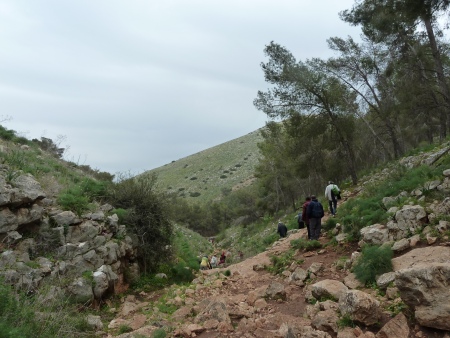
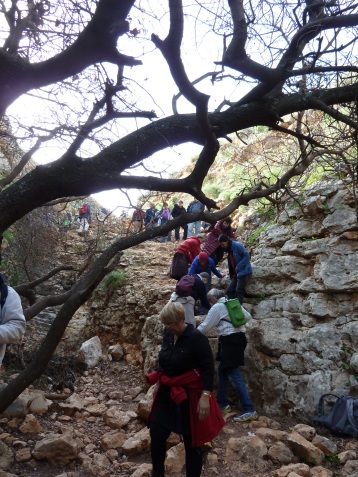
All around us, Nature was beckoning. And everywhere, Anat, our guide, found cause to reference the Bible. For example, almost before we started, we practically stumbled across a clump of mandrakes:
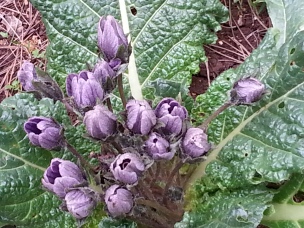
“The mandrakes give forth fragrance, and at our doors are all manner of precious fruits, new and old, which I have laid up for thee, O my beloved.” (Song of Songs 7:14)
And here it is, (to 2:35) set to music by Zvi Sherf and sung by the all-girl group Sexta:
Besides the mandrakes, there were anemones, red and white, and everywhere, growing between rocks and crevices, cyclamens, that most humble – and most beautiful – of flowers.
The cyclamen shows its humility in its bowed head, but legend has it that the flower once stood proudly erect. When King Solomon ascended the throne of Israel, an angel appeared before him and told him to go forth and choose the loveliest of flowers and to fashion a crown for himself in its shape. Solomon went forth and saw the beauty of the cyclamen, whose petals bore the shape of a crown. He therefore ordered his craftsmen to fashion a crown for him, which would resemble the cyclamen. For this reason, the cyclamen was also known as “Solomon’s Crown”.
The crown itself was handed down, generation after generation, until the Babylonians battered down the walls of Jerusalem, looted the Royal Treasury, stole the crown and took the people of Judaea into captivity, together with the surviving members of the Royal Family. From that day onward, the cyclamen’s head drooped in sorrow. So it is until our own times. The legend says that only when the crown of Solomon is placed once more on the head of the King of Israel, the Son of David, will the cyclamen once again hold its head erect.
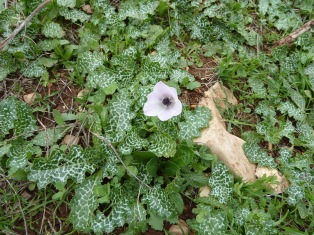
A white anemone
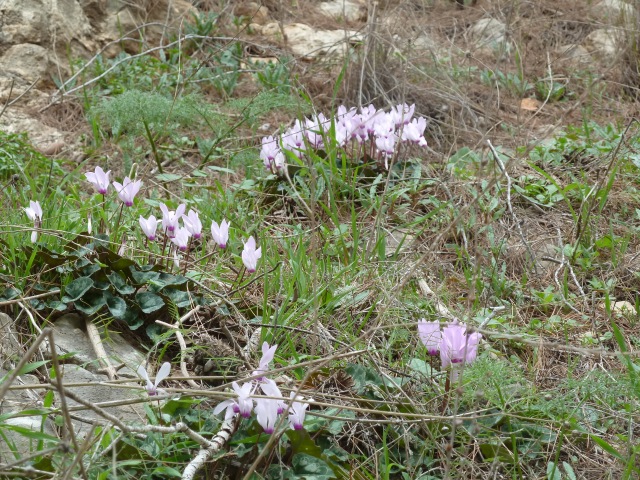
Cyclamens
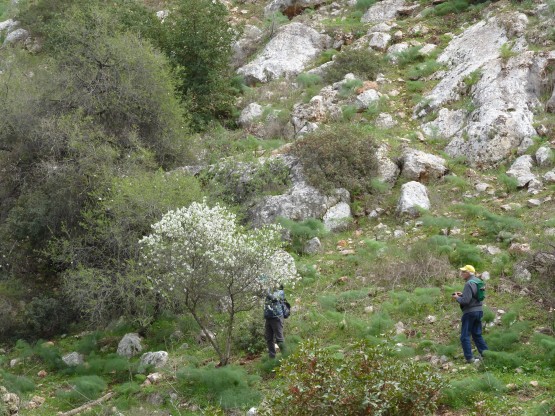
And finally, an almond tree in blossom
At one point, we stopped in a steep gorge to allow one of the aforementioned school groups to pass us, while Anat read to us Psalm 104, which is all of it a hymn to the glory of God as the creator of Nature. We discussed, in particular, verse 18:
“The high mountains are for the wild goats; the rocks are a refuge for the hyrax.”
The word I have translated as “hyrax” (שפן – shafan) is often mistranslated into English as “rabbit” – and indeed, these furry, short-eared little creatures are also sometimes known as “rock rabbits”, but they are not to be confused with the larger, long-eared bunnies so popular as pets in Europe. According to Anat, there are hyraxes in abundance in the Gilboa, but they only emerge from their hiding places when the sun is shining.
It was not shining – yet – although the further we descended along the channel of the now-dry stream, the warmer it got, and the sun did eventually emerge. We did not see any hyraxes, however. They are very shy creatures.
By the time we reached the end of the stream bed, it was already half past two in the afternoon. We had a late lunch at Beit Hashita, where I had an excellent houmous, before proceeding to the shores of Lake Kinneret (the Sea of Galilee) and the cemetery of Kvutzat Kinneret, last resting place of many leaders of the Zionist Labour movement, but most importantly, from our point of view, the place where the poetess Rachel (1890 – 1931) and the composer-songwriter Naomi Shemer (1930 – 2004) are buried.
Both women were heavily influenced by the Bible. Rachel identified strongly with the Matriarch Rachel. In one of her poems, Hen Dama (הן דמה – Behold, her blood), she compares herself to the Biblical Rachel:
“Behold, her blood in my blood flows,
Behold, her voice within me sings –
Rachel, herding the white flock,
Rachel – my mother’s mother.”
In another poem, Zemer Nogeh (זמר נוגה – A Melancholy Song), better known as Hatishma Koli (התשמע קולי – Will you hear my voice?), and made famous, in the setting by Shmulik Kraus, as the song which Rona Ramon dedicated to her husband, Ilan Ramon, Israel’s first astronaut, on board the ill-fated space shuttle Columbia, the poetess foresees that “My final day is already at hand, perhaps.
Already the day is near, of parting tears.
I will await you, till my life is extinguished,
As Rachel awaited her beloved.”
As Anat pointed out, the Bible tells us that Jacob waited seven years for Rachel – only to be tricked into wedding her older sister, Leah. We are told that those seven years “seemed unto him but a few days, for the love he had to her.” (Genesis 29:20). We are never told about Rachel’s feelings during those seven years – but Rachel the Poetess gave voice to Rachel, our Mother.
And what of Leah, the unwanted wife, the one whom the Bible describes as “hated”?
Did Jacob continue to hate the woman who bore him six sons and a daughter, more children than all the rest of his wives put together? The Israeli songwriter Ehud Manor refused to believe he could have done so, and in his song “I love you, Leah”, he puts into Jacob’s mouth these words:
“Behold, many days have passed
And my two hands have grown weary,
And how beautiful your eyes have become,
Like Rachel’s eyes.
I love you, Leah.
I love you, proud one.
If I forget thee, Leah,
My name is not Israel.”
Note the Biblical allusion in the words “If I forget thee”, reminiscent of Psalm 137 – “If I forget thee, O Jerusalem, let my right hand forget its cunning” – an allusion hinted at also in the words “my two hands have grown weary”.Here is the song, set to music by Zvika Pik, and sung by Lior Sa’ado on the Israeli talent show “A Star is Born” (the Israeli version of “American Idol” or “Britain’s Got Talent”).
Perhaps the most poignant of Rachel the poetess’s comparisons of herself to her Biblical namesake is the poem “Barren” (עקרה – Akara), written in 1927/8. Rachel the poetess never married and her love life was tragic. She compares herself to our mother Rachel who, for many years, longed for a child but was forced to behold the fecundity of her elder sister Leah, the “hated” wife, before finally giving birth to Joseph, and then dying at the birth of Benjamin. In this poem, she compares herself, not only to Rachel the Matriarch, but also to Hannah who, though herself “the favoured wife” of Elkanah, had no children of her own until she came to the Tabernacle at Shiloh, where she prayed silently for a child, though her lips moved, was rebuked by Eli the High Priest, and finally gave birth to the prophet Samuel (1 Samuel 1).
“If I only had a son! A little boy,
Black-curled and clever.
To hold his hand and slowly walk
Through the garden paths.
A child.
A little one….
I will yet complain bitterly like Rachel, our Mother.
I will yet pray, like Hannah at Shiloh.
I will yet await him.”
This poem has been set to music many times, by such diverse composers as Paul Ben Haim, Yehuda Sharett and Mordechai Zeira. In fact, there are at least sixteen melodies to the song, some of whose composers are unknown and which have been considered “popular” or “folk” melodies. Here is is one of these settings, by the prolific composer Anonymous 😉 performed by Dorit Reuveni and Hanan Yovel.
Unlike the poetess Rachel, who was already nineteen years old when she first came to the Land of Israel, the composer and songwriter Naomi Shemer was born in the kibbutz on the banks of the Kinneret and the language of the Bible was hers from birth.
Naomi Shemer makes reference to the Bible in many of her songs, which Anat played to us. We discussed them, as we stood at the site of her grave which, like that of Rachel’s, overlooks the Kinneret. One such is Kad Hakemach (כד הקמח – “The Jar of Meal”) – a modern retelling (1986) of the story of Elijah and the Widow (1 Kings 17).
“I read in the Book of Kings,
In the 17th chapter,
I read about the Man of God
Who said
The jar of meal shall not be spent,
Neither shall the cruse of oil fail
Until the time that rain shall fall
Upon the land.
And when the rivers dried up
And the rain tarried,
That man hewed the words
From his heart…
And in these hard times,
Days of neither dew nor rain,
Always I return to that man,
And then I remember…”
Those familiar with the Bible will recognise many Biblical turns of phrase and allusions in this song, and in particular, the reference to the lack of dew or rain, echoing both Elijah’s prophecy (1 Kings 17:1) and David’s lament for Saul and Jonathan (2 Samuel 1:21)
“Ye mountains of Gilboa, let there be no dew nor rain upon you, neither fields of choice fruits; for there the shield of the mighty was vilely cast away, the shield of Saul, not anointed with oil.”
I could go on forever about Naomi Shemer, but since sunset was rapidly approaching and we were obliged to take leave of the Kinneret, I, too, shall end here and leave you with this view of the lake, and of the quiet graveyard which the founders of the Jewish Labour and kibbutz movements, soldiers, farmers and fishermen share with poets and musicians, all of them dreamers who, together, helped rebuild a nation.
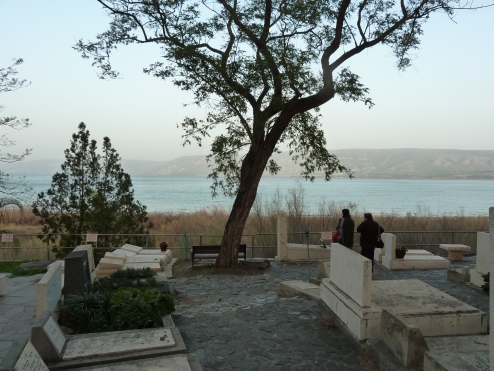

I enjoy these posts and learn so much. I did not know the story of the cyclamen, I did not know any of this information before, but I found that most interesting. You really need to be in good condition to go on these trips, I would never be able to not fall.
There are, in fact, several versions of the legend about the cyclamen. That one is my favourite.
As for having to be in good shape to go on these trips – most of the trips in this series are not quite so challenging – fortunately 😉
I loved every word and as I know the Bible, your words came even more alive for me.
To be there to hike there with you and the group would be an event that would leave me completely happy. To walk in that historical and holy land would be my wish if I could only do so. (heart related issues though I am much better now).
I read each paragraph slowly, devouring it all and I loved the pictures as well. By the way, there is something special to me about those white rocks I see in the picture with the almond tree in bloom (which I cannot see here where I am…so I enjoy yours). The whiteness of the rock is very appealing for some reason. They immediately “called” to me. ❤
You are invited to join me (virtually speaking, at least) for future field trips in this series and also to go back and read about previous trips (just type “929” or “Bible” to search for them). This is my second year with this group from Yad Ben Zvi and I’m enjoying every minute 🙂
sorry for the typo above. Meant to strike out “have” in the phrase about ‘leave me’.
I found it and deleted it for you 🙂
And seeing the wind farm in so ancient a place seems jarring, but necessary of course.